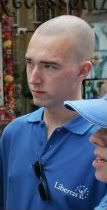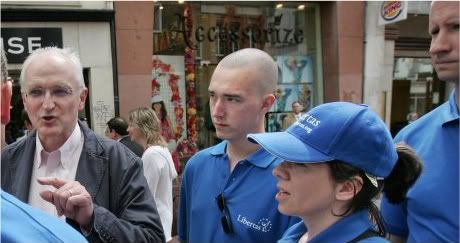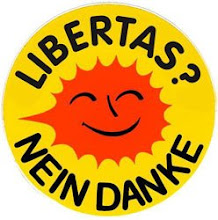Economis Crisis 'not helping' Eurosceptics gain ground in eastern and Central Europe
other languages available [fr][de]
Euractiv.com
Published: Friday 27 March 2009
The global economic crisis, which has severely hit Central and Eastern Europe, does not appear to have strengthened the positions of various extremist and Eurosceptic political groups there, shows a round-up by EurActiv's network in the region.
With just ten weeks to go until the EU elections, and despite numerous problems caused by the economic recession and its associated capital outflow, the political landscape in Central and Eastern European countries depicts a stagnant if not downward trend in support for the region's extreme-right, extreme-left, nationalist and anti-European forces.
After five years of EU membership, support for Eurosceptics in Poland - the biggest EU country in Central and Eastern Europe - has noticeably fallen. In Romania, the region's second-largest country, recent elections kept the extremists out of the national parliament (EurActiv 15/12/08).
Inspired by external political factors such as the Irish-born Libertas movement, mobilisation against the Lisbon Treaty is failing to gain momentum in many countries in the region, like Bulgaria, Romania and even Hungary, where societies do not appear to be particularly interested in the details of the new EU treaty. Such mobilisation is apparently only working to a limited extent in Poland and Slovakia.
Czech Republic
But in the Czech Republic, where the Lisbon Treaty in fact lies stalled in the Senate, the subject is perhaps bringing together political forces as diverse as the Communists (who are at least in theory internationalists) and sovereignists.
The far-left Communist Party of Bohemia and Moravia (KSČM) is the only extremist party expected to win several seats in the European Parliament this June. Although not openly Eurosceptic or anti-EU, the Communists – using revolutionary rhetoric - are vehemently opposed to cooperation with NATO and the United States.
Under the veil of promoting peace, the party is against the development of EU military capacities, against the deployment of army units on missions abroad, against the presence of foreign troops on Czech territory and thus against the idea of EU becoming a significant player on the international scene. Party leaders consistently avoid the question of adopting the euro, as well as ratifying the Lisbon Treaty.
In 2004, KSČM won six seats (with 20% of the vote) out of the 24 reserved for Czech MEPs, and thus ranked second in the elections just after the Civic Democrats (ODS), who gained nine seats. The latest survey (conducted in February 2009) indicates that the Communists would now rank third after ODS and the Social Democrats (ČSSD) with 16% of the vote.
The prospects of far-right, nationalist and other Eurosceptic parties are dim, mainly due to their similar manifestoes and agendas. Vladimír Železný founded a party called 'Libertas.cz', which was originally meant to be a sister party of Declan Ganley's 'Libertas.eu'. But in the meantime, Železný has distanced himself from Ganley and even labelled Czech President Václav Klaus his 'guru'.
Almost all of the new right-wing Eurosceptic parties, including Petr Mach's Party of Free Citizens (SSO) and Jana Bobošíková's coalition of parties, called 'Suverenita' (Sovereignty), look up to the president and seek his blessing.
The appearance of new Eurosceptic parties is a reaction to Klaus's call for the creation of a new political force. In early March, Klaus called upon the numerous Eurosceptic parties to work together so that they have a chance of winning seats in the European Parliament elections. This is because Mach – a Klaus protégé – has been refusing to cooperate with Železný and Bobošíková.
The radical Workers' Party (DS), which is believed to have close ties with the Neo-Nazi movement, has also declared its intention to run in the upcoming Parliament elections. The government moved to ban the party recently, but failed to provide sufficient evidence to the court. Their popular support is insignificant.
Slovakia
None of the Slovak political parties is offering an alternative to Slovak membership in the European Union. The only relevant party that criticises the EU and is against the ratification of Lisbon Treaty is KDH (the Christian Democratic Movement), a member of pro-Lisbon EPP-ED group.
According to KDH leaders, the Lisbon Treaty takes too many powers away from Bratislava in favour of Brussels, and diminishes the weight of Slovakia in the Council of Ministers, and it thus sees it as a threat to national sovereignty. KDH also sees problems related to the possible impact of the Charter of Fundamental Rights on national legislation governing ethical issues. KDH is expected to make it to the EU assembly again with two seats, according to estimates.
Another political party with similar Eurosceptic views is KDS (the Conservative Democrats of Slovakia). The party was only recently established, by four leading figures who left KDH and formed a candidate list for the European elections together with a non-parliamentary party (OKS, Citizen-Conservative Party). But they are not expected to make it to the European Parliament, as their support is very modest at present.
The right-wing OKS (Civic Conservative Party), which alone has minimal popular support (less than 1%), basically wants the EU to be reduced to governing the single market, because according to them, almost all other areas should be taken at national level. They claim that the European Parliament should be dissolved, because they do not consider it a proper parliament: they see no 'European nation' for it to represent.
As for the nationalist camp, the Slovak National Party (SNS), which is currently not represented in the EU assembly, it could gain two or a maximum of three seats, according to estimates. It is supposed to become part of Union for Europe of Nations (UEN) group. SNS also sees Slovakia's EU membership as an "unavoidable decision". But surprisingly, as a member of Fico's governing coalition, it supported the Lisbon Treaty without reservation in the Slovak parliament.
Libertas founder Declan Ganley announced plans to establish 'Libertas Slovakia' during his visit to the country in February. It is still not registered, however, and no official candidates are known.
Poland
The League of Polish Families (LPR), a Eurosceptic party which no longer has representatives in the Parliament, is trying to prove itself in the upcoming EU elections. They too are cooperating with Ganley, and hope to get into the EP by means of a Libertas list.
Libertas has been just registered in Poland and is headed by Daniel Pawlowiec of the LPR and Artur Zawisza of the Rights of the Polish Republic (PR) party, which also hopes to use his electoral platform.
In spite of unfavourable polls, Roman Giertych, a former LPR president and ex-deputy prime minister, said he was sure that this party would be represented in the new EP. In the first Polish EU elections in 2004, LPR won second place, with over 15%, and now has ten MEPs.
Another group of Eurosceptics is being prepared by politicians close to the ultra-catholic Radio Maryja. Some of them stem from the PiS (Law and Justice) party established in 2001 by the Kaczyński twins. The ex-ruling conservative party can count on the support of this controversial, but nevertheless popular, radio station.
Hungary
In Hungary, the most visible part of the extremist political landscape is Magyar Gárda (Hungarian Guard), an extreme right, nationalist and paramilitary movement reminiscent of Fascist times. Its members have been active, marching in uniforms and staging assaults against Roma and other ethnic groups.
The Magyar Gárda was registered as an organisation to "protect the country's heritage and culture" in June 2007, with the aim of establishing a "framework for national defence". The first 56 members of the movement were inducted in August 2007.
In December last year, a Budapest court ruled that the organisation must be disbanded, a ruling which the Magyar Gárda is in the process of appealing. Gabor Vona, the founding chairman of the Magyar Gárda and head of the Jobbik party, said the movement's members would "write a new chapter in Hungarian history".
Krisztina Morvai, who heads the party's list for the upcoming European parliamentary elections, said her party would make every effort to "regain national assets illicitly given away" and added that all laws should be abolished that "granted privileges to foreigners to the detriment of Hungarians".
Morvai, who has described Hungary's government as a "gang of robbers", also said loans taken from the International Monetary Fund and other international banks should be considered as repaid and Hungary should not make any further debt-servicing payments.
Romania
The ultra-nationalist Greater Romania Party (PRM) leader Corneliu Vadim Tudor announced he would top his party's list for the Parliament elections. After winning almost 20% of the vote in the national legislative elections in 2000, the hold of this political force is declining and in the last elections, PRM was unable to enter parliament, after only receiving 3.15% of the vote and failing to reach the 5% threshold. Tudor, once a Communist propagandist reborn into nationalism, draws inspiration mainly from anti-Hungarian conspiracy theories.
George Becali's New Generation Party, often seen as intolerant and far right, also failed to make the Parliament. Becali, also known as Gigi Becali, is a controversial businessman and politician, mostly known for his involvement in football. Becali claims he is a follower of the fascist Romanian Legionnaire Movement.
One of his favourite targets are homosexuals, and he even threatened to "finish" them if he is given the power. At the elections for the European Parliament, held in November 2007, his party (PNG-CD) obtained 4.86% of the popular vote, just under the 5% threshold.
Bulgaria
The electoral list of extremists Ataka will probably be topped by the current MEPs from this political party, MEP Dimitar Stoyanov recently said. A recent survey shows that some 9% of the voters could back Ataka at the forthcoming European elections, as well as for the parliamentary elections to be held a few weeks later.
Stoyanov became known in the European Parliament two years ago, by sending an email to every MEP attacking Lívia Járóka, a Hungarian MEP of Roma origin and the 'MEP of the Year'. Stoyanov's email stated that his own country had the "prettiest Gypsies" and informed anyone who was interested that he knew where you could buy 12-year-old Gypsy brides for "up to €5,000". Stoyanov is certain to stay on as an MEP, because the leader of Ataka, Volen Siderov, is his step-father.
Quoted by the daily Dnevnik, sociologist Yuriy Aslanov said probably the only Bulgarian parties to make it to the European Parliament will be the Bulgarian Socialist party (a PES member), GERB (Citizens for European Development of Bulgaria), a recent political player built around current Mayor of Sofia Boyko Borissov and affiliated to the EPP-ED, DPS (Movement of Rights and Freedoms), a Turkish ethnic party affiliated to ALDE, and Atak












